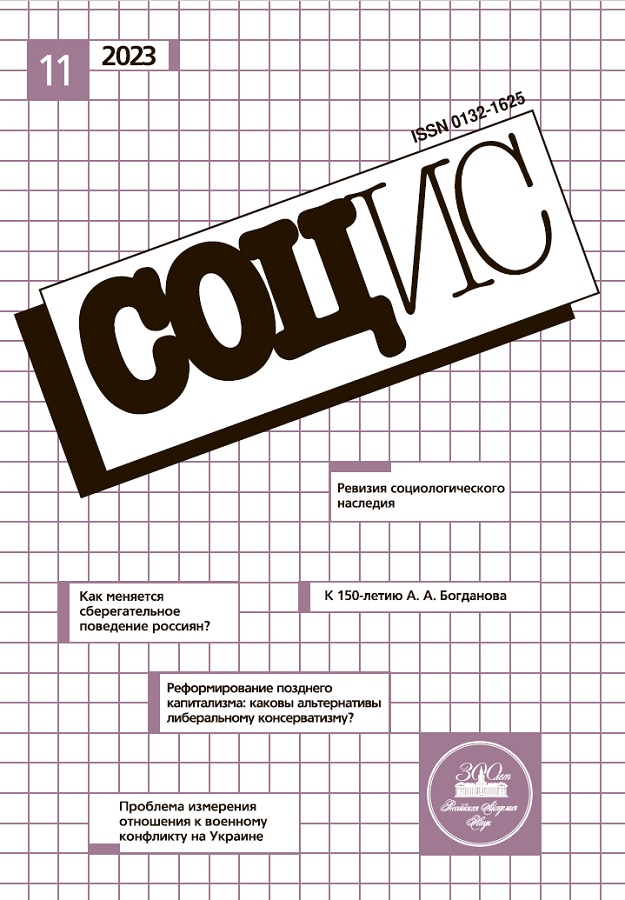Savings Activity of Russians: Dynamics and Factors
- Autores: Tikhonova N.E.1,2
-
Afiliações:
- Institute of Sociology of FCTAS RAS
- HSE University
- Edição: Nº 11 (2023)
- Páginas: 67-79
- Seção: Articles
- URL: https://cijournal.ru/0132-1625/article/view/661969
- DOI: https://doi.org/10.31857/S013216250028533-9
- ID: 661969
Citar
Texto integral
Resumo
Based on the data of a number of all-Russian studies of the Institute of Sociology of FCTАS RAS, the article characterizes saving behavior factors of Russians and the dynamics of its change in 2003-2023. Some classical concepts explaining the savings behavior of the population are tested in relation to Russian conditions. It is demonstrated that their conclusions are only partially justified in the Russian society. It is shown, in particular, that representatives of mass strata of the population reacted to successive external shocks of different nature in recent years depending on the nature of these shocks, and not only on their severity or expected duration: to crises of purely economic nature, in accordance with the classical postulates, Russians responded by striving to maintain their usual level of consumption at the expense of savings, while in case of adding geopolitical risks and increasing uncertainty of the future, the prevalence of savings was increased. If for small savings no micro-level factors have been identified to have significant impact on their availability, then in the formation of savings that allow you to live on them for at least two months, subjective factors play a key role, in particular, readiness for long-term planning of one’s life, as well as a sense of respective economic and social success. At the same time, economic factors, though important, play a noticeably lesser role, affecting mainly amounts of savings.
Sobre autores
Natalia Tikhonova
Institute of Sociology of FCTAS RAS; HSE University
Autor responsável pela correspondência
Email: netichon@rambler.ru
Moscow, Russia
Bibliografia
- Каравай А.В. Российские рабочие: финансовое поведение и установки // Мониторинг общественного мнения: экономические и социальные перемены. 2015. № 2(125). С. 83–95.
- Козырева П.М. Финансовое поведение в контексте социально-экономической адаптации населения (социологический анализ) // Социологические исследования. 2012. №7. С 54–66.
- Кузина О.Е. Финансовая грамотность и финансовая компетентность: определение, методики измерения и результаты применения в России // Вопросы экономики. 2015. № 8. С. 129–148.
- Кузина О.Е., Моисеева Д.В. Стратегии финансового поведения россиян: понятие, динамика, факторы // Вопросы экономики. 2021. № 10. С. 71–88. doi: 10.32609/0042-8736-2021-10-71-88.
- Литвинова В.В. Финансовое поведение человека и определяющие его факторы // Журнал экономической теории. 2020. Т. 17. № 1. С. 230–237.
- Макар С.В., Ярашева А.В., Марков Д.И. Финансовое поведение как результат взаимодействия людей в социально-экономическом пространстве // Финансы: теория и практика. 2022. Т. 26. № 3. С. 157–168. doi: 10.26794/2587- 5671-2022-26-3-157-168.
- Модель доходной стратификации российского общества: динамика, факторы, межстрановые сравнения / Под общ. ред. Н.Е. Тихоновой. М.; СПб.: Нестор-История, 2018.
- Стребков Д.О. Основные типы и факторы кредитного поведения населения в современной России // Вопросы экономики. 2004. № 2. С. 109–128.
- Стребков Д.О. Трансформация сберегательных стратегий населения России // Вопросы экономики. 2001. № 10. С. 97–111.
- Финансовая грамотность и финансовое просвещение населения: атлас российских практик / Отв. ред. Н.В. Аликперова. М.: ФНИСЦ РАН, 2021.
- Deaton A., Paxson C. Saving, Aging and Growth in Taiwan // Studies in the Economics of Aging / Ed. by D. Wise. Chicago: The University of Chicago Press, 1994.
- Katona G. Psychological economics. New York: Elsevier Scientific Publishing Company, 1975.
- Zelizer V. A. The Social Meaning of Money: Pin Money, Paychecks, Poor Relief, and Other Currencies. Princeton: Princeton University Press, 1997.
Arquivos suplementares










